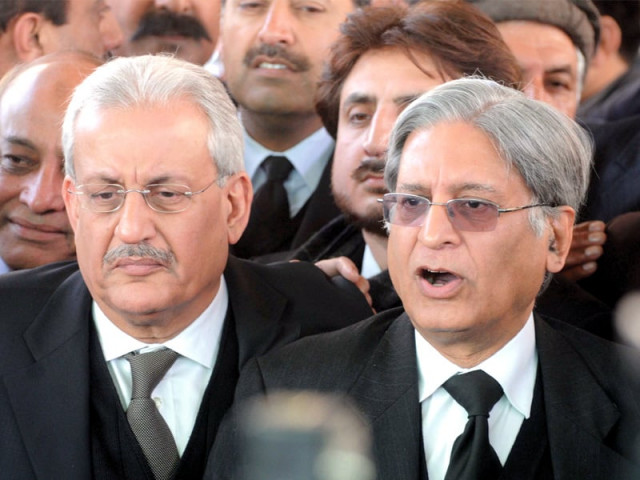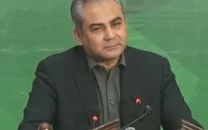Contempt case: Gilani’s contempt hinges on Zardari’s immunity
Proceedings adjourned till Feb 1 for PM’s counsel to chalk out case based on Article 248.

Contempt case: Gilani’s contempt hinges on Zardari’s immunity
Prime Minister Yousaf Raza Gilani arrived at the Supreme Court smiling and waving to the television cameras outside, amid a heavy security presence which included helicopters.
But perhaps it wasn’t just the police protection that gave the premier a sense of security and comfort. After all, he was appearing before the court with Barrister Aitzaz Ahsan by his side.
And that security was not misplaced.
Aitzaz, a well-respected practitioner and held in high regard for his role in the 2009 lawyers’ movement, sparred with the seven-judge bench over the central issue of President Asif Ali Zardari’s immunity. The lawyer held them off, with neither conceding an inch, before proceedings were adjourned until February 1.
“In the Constitution, there is complete immunity for the president,” was Gilani’s explanation to the court for not writing to Swiss officials to restore graft cases against President Zardari in line with the NRO verdict.
The PM’s voice was confident and respectful. Across the bench, Justice Asif Saeed Khosa was pleased to see him, terming Gilani’s appearance as his submission to the majesty of law.
“I have come today to show my respect to this court,” Gilani said. “It will not give a good message to proceed against a president who is elected by a two-thirds majority … There is complete immunity for head of states everywhere.”
According to the judges, the central legal issue is Article 248 of the Constitution, which ostensibly provides immunity to the president from money-laundering cases abroad. Justice Sirmed Jalal Osmani put this issue to Ahsan, asking: “How do you link the writing of letter to immunity?”
In response, Ahsan said he would like to avoid the question of immunity, for he was confining his submissions to proving the PM’s innocence.
The PM, Ahsan argued, decided not to write the letter on the advice of the ministry for law, justice and parliamentary affairs. He added he would show the court that the NRO judgment could not be implemented because of the constitutional bar on initiating criminal proceedings against the president.
Holding a number of stapled court orders, Justice Khosa observed that the government had delayed implementation for two years – but only now had cited immunity as the reason.
Ahsan was nimble in response again, saying he was not raising the question of immunity because his argument related to the fact that the prime minister acted in good faith. The court, he argued, would have to determine if Gilani was guilty of wilful disobedience or not.
The judges, though, would not be swayed.
Justice Ejaz Afzal Khan said that Article 248 served as the basis of the PM’s disobedience. Justice Khosa observed that if the court found that the immunity existed, it could discharge the notice issued to the PM. “What would you do if the case is otherwise?” Justice Khosa asked.
Ahsan, ever tactful, said he would do what the Constitution required him to do.
Justice Osmani asked Aitzaz to raise the matter before the court if he thought the PM was justified in his belief in presidential immunity as the basis for not complying with the court order. Aitzaz hit this one straight back across the court. He said he would not raise the matter, but the court could do so on its own. “Why must the court raise the question of immunity?” Justice Osmani asked.
Aitzaz said that immunity for the president extended even outside Pakistan and no one could push “a person into the fire of foreign cases.” He cited the cases of Fidel Castro and Muammar Qaddafi as relevant guidelines.
The bench had an answer for Aitzaz’s tricks: Justice Osmani observed that if the counsel addressed the court on the question of immunity, then he would not have to demonstrate that the PM acted in a lawful manner.
Just as they the tide began to turn, Aitzaz tactfully called ‘time out’, asking the court to grant him a few days to chalk out his case. This was granted, but not before Justice Osmani declared that next time they would “grab the bull by its horns.”
Talking to reporters outside, Aitzaz said he would satisfy the court on the question of immunity because the judges had insisted upon it.
Among those also present were Foreign Minister Hina Rabbani Khar, ANP chief Asfandyar Wali Khan and PML-Q leader Chaudhry Shujaat Hussain.
After the hearing, members of various bar associations chanted slogans in support of the court.
(Read: The PM’s day)
(With additional input from agencies)
Published in The Express Tribune, January 20th, 2012.



















COMMENTS
Comments are moderated and generally will be posted if they are on-topic and not abusive.
For more information, please see our Comments FAQ